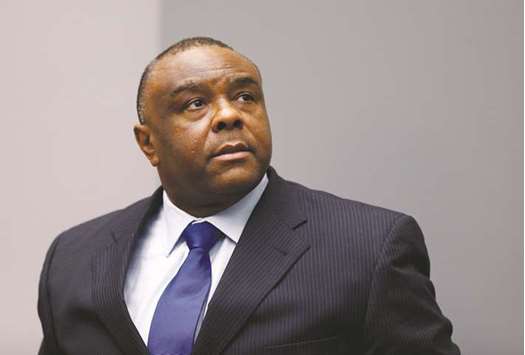His return to Democratic Republic of Congo could dramatically shake up the political landscape ahead of the election, which is meant to choose a successor to President Joseph Kabila, who has held power since 2001.
Kabila, however, has not yet ruled out trying to circumvent term limits to stand again, keeping the country in suspense ahead of what would be its first democratic transition of power.
Bemba, a former rebel leader and vice president, left Congo in 2007 and spent the last 10 years in prison in The Hague. He is currently free in Belgium pending a hearing related to a separate conviction for witness tampering.
Given that the maximum sentence on the witness tampering charge before the International Criminal Court is five years in prison, Bemba should be formally released some time after that hearing.
“In principle, Senator Jean-Pierre Bemba Gomba will return to the country in July,” the spokesman for his Movement for the Liberation of Congo (MLC) party, Michel Koyakpa, told Reuters.
“This will first of all be to participate in the MLC congress, which will take place July 12-13 in Kinshasa,” Koyakpa said, adding that Bemba would submit his candidacy for president later in July if selected as the party’s nominee.
The government has said that Bemba has the right to return home but has offered mixed messages about whether he might face further criminal prosecution or be allowed to contest the presidential election. Bemba is popular in western Congo and his return could give a jolt to a largely moribund opposition.
But it could also further divide Kabila’s opponents, several of whom are angling to succeed him.
Bemba came third in a rare nationwide opinion poll by New York University’s Congo Research Group in March, behind opposition leaders Moise Katumbi, who is in exile in Europe due to myriad legal problems at home, and Felix Tshisekedi, the president of Congo’s largest opposition party.
If Kabila does not try to stand himself, he is expected to anoint a successor to represent the ruling PPRD party.
That person would benefit from the party’s significant war chest and ties to state institutions.
Bemba finished runner-up to Kabila in a 2006 election that his supporters said was marred by fraud, triggering battles in the streets of Kinshasa between his militiamen and state security forces.
US imposes sanctions on top officials for graft
The US State Department says it has imposed sanctions and visa bans on top DR Congo officials for corruption linked to long-delayed elections due in December and for rights abuses.
It asked President Joseph Kabila, in power since 2001, to ensure a peaceful transition of power in the December 23 election.
Several unidentified “senior DRC officials” were targeted for “involvement in significant corruption related to the DRC’s electoral process,” a State Department communique said late Thursday.
“Further, the Department is taking steps to prevent entry into the United States of certain DRC officials involved in human rights violations,” it said.
“Today’s actions send a strong signal that the US government is committed to fighting corruption, to supporting credible elections that lead to DRC’s first peaceful and democratic transfer of power, and to holding accountable those who are responsible for significant corruption or serious violations of human rights.”
The State Department on Thursday also said it would send career diplomat Michael Hammer as ambassador to the Democratic Republic of Congo, a post that has been vacant for several months.
Hammer had served as ambassador to Chile between 2014 and 2016 and was also Assistant Secretary of State for Public Affairs.
He has worked in five foreign missions. A tweet from the US embassy in Kinshasa added: “Now is a critical time to take such measures, to help dissuade Kabila from putting his name on the ballot and help ensure a credible election.” Kabila, 47, took over from his assassinated father in 2001, and presides over a country with a dark reputation for corruption, poor governance and violence.
He has not clearly stated whether he will step aside despite appeals from the United States, France and Britain for him to declare that he will not seek re-election.
Escalating tension over Kabila’s future has fuelled protests, leading to a security crackdown that has claimed dozens of lives and caused concern among the DRC’s neighbours.

